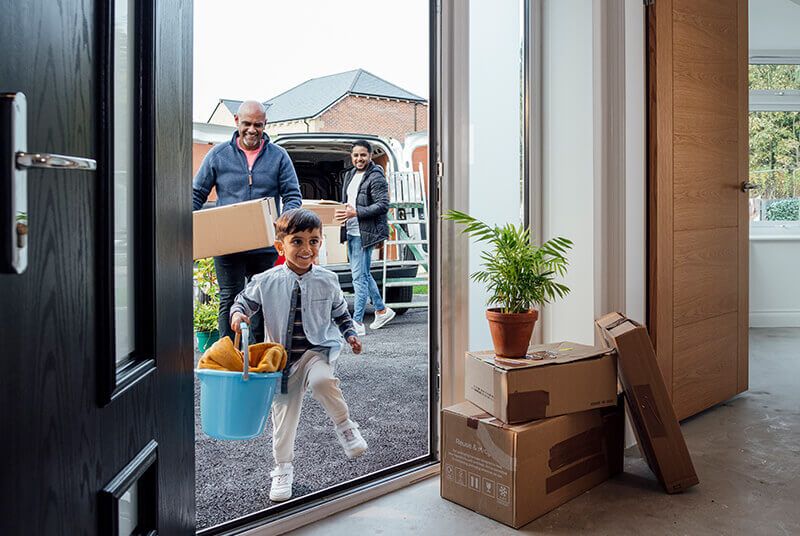Leasehold vs freehold
A leasehold vs freehold property means you own the property but not the land. Discover the differences and advantages in our guide to property tenures.

Understanding property tenures: leaseholds vs freeholds
Before buying a property in the UK, understanding the type of property ownership — whether it’s freehold or leasehold — is important. These terms may sound like legal jargon, but they can impact your responsibilities, expenses and long-term plans.
In this guide, we’ll delve into the nitty-gritty of freehold and leasehold properties, so you don’t have to. We’ll explore everything from what they mean, their benefits to how they differ in terms of costs, resale value and legalities.
What is a freehold?
In simple terms, if you own a property on a freehold basis, you own the building and the land it sits on. There’s no time limit on your ownership, and it’s all yours.
Responsibilities of a freeholder
Being a freeholder comes with exciting perks! You’re essentially the captain of your property ship which means you’re responsible for the maintenance of the property and the land. You also have the freedom to make upgrades to your pad without needing permission from a landlord. It’s your space to shine!
What is a leasehold?
Having a leasehold means you own the property but not the land it’s built on. You have a lease with the freeholder (typically a ‘landlord’) for a number of years, decades or even centuries. The length of the lease is important, as it can affect your ability to sell the property in the future.
Responsibilities of a leaseholder
As a leaseholder, you may have to pay ground rent to the freeholder, as well as other charges like service fees for maintenance of common areas. You may be restricted in what changes you can make to your home.
Types of leasehold properties
Typically, flats and maisonettes are sold as leasehold properties. Some houses can also be leasehold, usually through shared ownership schemes. But make sure to check the length of the lease when considering these types of properties.
Differences between freehold and leasehold
- Ownership of land — in freehold, you own the land, whereas in leasehold, the land belongs to someone else. This distinction is one of the main differences and often a game-changer for many homebuyers.
- Duration of ownership — imagine freehold ownership as an endless adventure; it goes on and on. But when you go for a leasehold, it’s more like a Netflix subscription; you’ve got it for a specific time, which will be specified in your lease agreement.
- Costs involved — leasehold homes often come with extra costs, like service charges and ground rent. These can be things like recurring bills that pop up annually or bi-annually. It’s possible that they may even sneak up over time.
- Resale value — a freehold property generally has a higher resale value compared to a leasehold with a short lease. The shorter the lease, the more difficult it may be to sell the property or secure a mortgage.
Buying a freehold share
If you’re a leaseholder, you have the option to buy a share of the freehold. This process is known as ‘enfranchisement’ and it means you have more control over the property.
Keep in mind - you’ll need at least half of the leaseholders in the building to agree to buy a share. This can be a complex process involving legal fees, so it’s essential to consult with the experts.
Alternative options: commonhold properties
Ever heard of commonhold? It’s a type of property ownership where you and your fellow homeowners each own your own little slice of the pie, which could be a cosy flat in a building for example. The only difference here is that you all come together as a team to own and take care of the shared areas.
Think of it as a more democratic way of living. And guess what? There’s no landlord in the picture! It’s all about homeowners working together to keep things running smoothly. This concept is relatively new in the UK, but it’s picking up steam bit by bit.
Extending the lease on a leasehold property
If you own a leasehold property, you can extend the lease at any time. However, once you’ve owned your home for two years, you have the legal right to extend your lease by 90 years. The cost for this can vary and is subject to negotiation with the freeholder.
It’s important to start this process well before your lease runs out to avoid any complications or higher costs.
Should I buy a leasehold or freehold property?
So, now that you understand the difference between freehold and leasehold properties when buying a home in the UK — which one is the one for you? Let’s take a look at some of the main pros and cons to get a better picture.
Advantages of owning a freehold property
- No lease to run out: one of the most significant advantages is that you don’t have to worry about the lease running out, as you own the property outright.
- No ground rent or service charges: freeholders don’t have to pay additional costs like ground rent or service charges, which can add up over time.
- Full control: you have complete control over the property, allowing you to make any changes or improvements without needing approval.
- Potentially easier resale: In many cases, it’s easier to sell a freehold as there is no lease that can impact asking price and mortgage rates.
Disadvantages of owning a freehold property
- Typically more expensive: as you’re buying the whole package, freeholds are usually more expensive than leaseholds to buy.
- More responsibility: When you’re the freeholder, you’re responsible for any upkeep or development costs for the property.
Advantages of owning a leasehold property
- Typically cheaper: You’ll find that freehold properties are usually cheaper to buy than leasehold properties.
- No responsibility for maintenance of the building: General maintenance is the responsibility of the freeholder.
- No responsibility for upkeep of communal facilities: Any work needed for the communal facilities falls within the responsibility of the freeholder.
Disadvantages of owning a leasehold property
- Limited ownership: As a leaseholder, you don’t have the same ownership rights and options as the freeholder. You’re effectively renting from them.
- Lease can run down: While many leases are long, it’s possible for them to run down. They can be renewed, but at an extra cost.
- May need to pay ground rent and service charge: You may need to pay the freeholder additional charges as a leaseholder.
- Require permission to make changes: As a leaseholder, you may need to seek the written permission of the freeholder before making changes to the property.
- Can be harder to sell: Generally speaking, the closer a leasehold is to running down, the more difficult a sale can be for a leaseholder.
While both have their pros and cons, consider the fact that your choice will depend on your long-term plans, financial situation and the type of property you’ve got your eyes on. It’s always wise to get guidance from legal advisors and the property pros so that you can be confident you’ve made the smartest decision.
FAQs
What does it mean to be a freehold tenant?
If you own the freehold, you’re not a tenant; you’re the owner.
What is a ‘less-than-freehold’ estate?
This refers to a leasehold or any form of property ownership that’s not freehold.
How important is the length of a lease?
The length of a lease is important as it affects your ability to sell the property and may impact your mortgage terms.
What are the rights of a leaseholder?
Leaseholders have various rights, including the right to extend their lease, the right to buy the freehold and the right to challenge service charges.
You may also like
16 tips for moving house
Read our step-by-step guide to moving house. From costs, paperwork and contracts, we’ve got you covered for a stress-free move.

